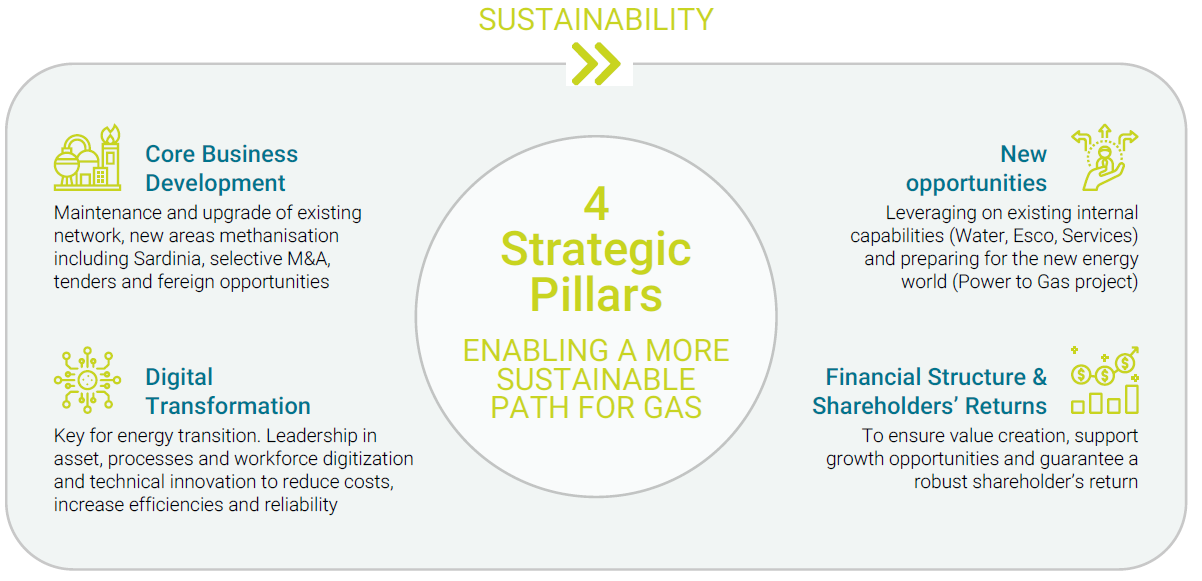Innovation and sustainability as the foundations for the future
The growth of Italgas, the contribution of the Group’s assets to the creation of the net-zero energy mix envisaged by the European Union for 2050 and the very future of the gas distribution sector itself continue to revolve around digital transformation. That is why Italgas has allocated a further € 1 billion to the digitisation of assets and processes, as well as to the reskilling of its people, in the 2020-2026 Strategic Plan. This commitment will be reflected in an overall investment of around € 2 billion in 2022, making the company the world’s first utility with a fully digitised network. A digital network is an infrastructure with built- in devices capable of giving and receiving information and can be controlled remotely and in real time. It is a necessary condition for the accommodation and distribution of renewable gases other than methane, such as hydrogen, biomethane and synthetic methane.
Italgas has chosen to transfer this important knowledge base, together with the best practices acquired in gas distribution, to other similar business areas, with the aim of fostering an efficiency boosting process. Within this context, € 240 million of investments was allocated to extending the digital skills to the water network management and energy efficiency sectors, in which the associated companies Italgas Acqua and the ESCos Seaside and Toscana Energia Green operate. In the water sector, the aim is to further improve the quality and efficiency of managed networks by means of a two-level intervention plan. On the one hand, by installing “water smart meters” to replace traditional meters for the 30,000 users served; and on the other, through the widespread installation of sensors along the networks, to enable the monitoring of all operational parameters of the infrastructures at all times, prompt and increasingly accurate detection of any faults and fast intervention in the event of leaks. Similarly, digital know-how is being rapidly and effectively put to use with the launch of various innovative projects aimed at saving energy and reducing the carbon footprint of consumptions. One such project is “Savegas”, a service offering energy efficiency measures for buildings, with a turnkey system to cut bills by up to 20%.
Digital transformation also concerns processes and people. In the case of the processes, driving this great change is the Italgas Digital Factory, which, operative since late 2018, has also continued working during lockdown. Inside the Digital Factory, physical and virtual rooms work in agile mode to digitise the company’s processes, creating a number of innovations that have further improved day-to-day operations. A practical example of this is the WorkOnSite application, one of the many created by the Digital Factory, which uses artificial intelligence to verify the conformity of worksites and the progress of works remotely (which was crucial in enabling the rapid reopening of worksites following the lockdown); or ShareView, smart glasses that allow technical experts to support their colleagues even from a great distance, so they can share their knowledge.
As for the people, all Italgas employees have now been provided with at least one mobile device and are involved in training, refresher and digital reskilling programmes. This approach proved invaluable during lockdown, to rise swiftly to the challenges of reorganising work and increase everyone’s skills. Moreover, with masses of data being collected from our infrastructures, people need to be in a position to interpret and use them in the best possible way.
Sustainability is therefore pivotal to the company’s business: it is at the heart of the Group’s operational and strategic decisions and, in the long-term, ensures consistency with the principles of respect for the environment, development of people and empowerment of the local communities. In this regard, we can see why, when defining the strategic drivers for 2026, Italgas was guided by the five pillars that represent the basic principles of sustainability with which the company has identified from day one: nurturing an ESG culture, choosing to put people first, creating value for the local area, customers and the market, and helping to make the system safer and more effective. These pillars are translated into objectives and measures for short- to medium-term implementation. They are also the source of the specific policies officialising the company’s commitment, including:
The sustainability and stakeholder engagement policy, which defines its vision on environmental, social and governance topics relevant to the corporate identity;
The Corporate Citizenship Policy, to further consolidate support for the local communities;
The Diversity and Inclusion Policy, to promote matters of diversity and encourage progress and innovation;
The Human Rights Policy, protecting human rights and equal opportunities;
The HSEQE Policy, to promote full compliance with the standards protecting health, safety, the environment and energy performance;
Policy for managing dialogue with all shareholders.
These policies are periodically updated and supplemented.


